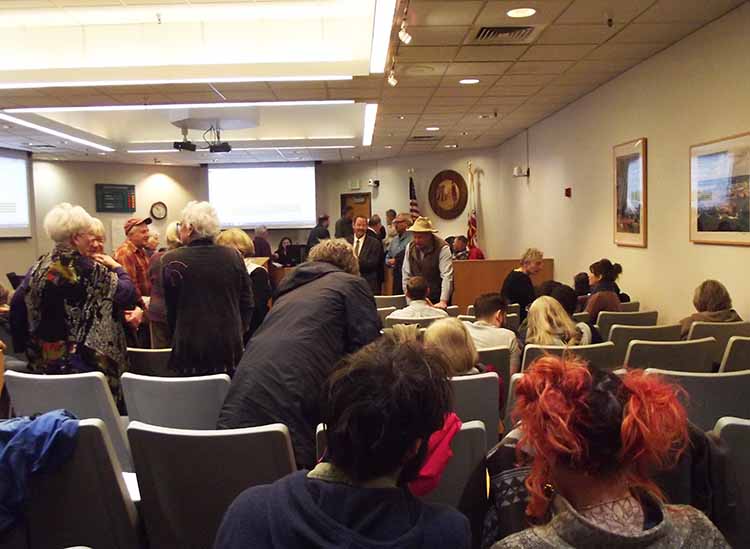UKIAH 1/24/1017 — After a grueling seven and a half hour long meeting, Thursday Jan. 19, the Mendocino County Planning Commission voted 5-2 to recommend that the board of supervisors adopt two ordinances to regulate medical cannabis cultivation. Devon Jones, Executive Director of the Mendocino County Farm Bureau, a non-profit organization devoted to protecting the interests of farmers and ranchers, spoke of her concerns about “regulatory creep” on the part of state agencies that receive referrals for cannabis cultivation permits from the county ag department.

The board of supes chambers fills up before the planning commission meeting.
Several environmentalists spoke out in favor of the measure to exclude new grows on rangeland. That measure, as well as a recommendation to adopt a woodland protection ordinance, stayed in, though the commission also recommended that the board consider amending the rangeland exclusion at a later date. And the spectrum of cultural attitudes regarding pot across the county was on full display. The commission decided to address this by recommending that the board of supervisors consider creating cultivation plans that tailored to specific communities.
While the language of the ordinances was not changed, the recommendations added additional mitigation measures to the initial environmental study’s recommendation. The crowd, which dwindled considerably by the end of the day, started out at over 100 people, with some standing in the back of the room and others taking a break in the hall. Only a few hardy souls made it to the very end.
Many of the mitigations have been hotly contested at previous meetings, such as the original requirement for dwelling units on cannabis cultivation sites in upland and rural residential zones. A requirement for dwelling units for grows on property in rural residential zones was part of the original plan, based on the theory that the property would be less susceptible to criminal activity if people lived there, but also out of a concern that potential housing stock would be removed from the county if residential properties were given over to cannabis cultivation.
The commission chose to recommend eliminating the requirement for a dwelling unit in upland residential zones. In RR10 and RR5 (rural residential parcels of ten and five acres, respectively), the commission recommended that applicants with an administrative permit to cultivate cannabis also not be required to build a dwelling, as long as they can demonstrate that cultivation won’t make it impossible to build a residence later.
Ellen Drell, of the Willits Environmental Center, has supported the exclusion of new grows on rangeland as well as advocating for an oak woodlands protection ordinance. But she also summed up the social divisions that have become glaringly obvious — and public — as the issue of regulating marijuana has remained at the forefront of the county’s political consciousness.
In her remarks to the commission, Drell observed that, “In a way, we’re talking about both environmental issues and social issues…we’re looking at the environmental impacts as a result of this ordinance [but] some of the social issues, I think, cannot necessarily be solved through this mitigated negative declaration…I think we shouldn’t cover ourselves with attempting to use this ordinance to solve every problem that’s confronting communities, though they are there and they need to be dealt with.” She concluded by stating that she “strongly supports” the ordinance, and that “If we don’t move, we’re just looking at another chaotic growing season.”
There is a trust gap between growers, whose culture has not involved a high level of detailed accounting and permitting practices, and non-growing residents of some rural neighborhoods who associate pot with home invasions, fierce dogs, and a transient labor force that doesn’t much care about the environment.
Phil Boynton, a resident of Ukiah’s Regina Heights neighborhood and a retired high school history teacher, illustrated the point explicitly in his own comments to the commission. “In this room, there are two groups of people,” he began. “One group, or their progenitors, came to Mendocino County to grow an illegal crop…their interest in rules and regulations was nil. And now we are dealing with the potential regulations, and their response to that, given their history, will probably be close to nil.” Referring to the changing regulations, he said, “It has to be judged on the basis of who is speaking and to what degree their history speaks, that they did obey the law [and] will obey the law, which, theoretically, you will help to make.” Unlike previous planning commission meetings, oratory representing a variety of opinions was applauded, and Boynton’s remarks were greeted with some clapping.
David Troxel, a grower from Laytonville, refined Boynton’s categories of people into categories of growers, saying, “We keep hearing about guerilla growers, people destroying the environment, and Mafia…that’s not the people in this room. The people in this room are not stupid. We know where North Dakota is, and we know where Fedex is, and our flowers can sell in North Dakota for $6,000 a pound. We’re lucky to get twelve, fifteen hundred a pound in the legal market in this state and that’s what the people in this room are choosing to do. The people in this room are choosing to let the sheriff know where we are, our names, our addresses, pay money for licenses, pay money to grow properly.” If these growers can’t get provisional licenses before licenses become available, he said, “Nobody in this room is going to be applying for those licenses. We’re going to be growing in Southern Humboldt or we’re going to be working at Safeway.” Troxell’s words, too, received some applause.
However, an ongoing concern throughout the process of regulation has been over-regulation. That concern is not limited to pot growers, as Devon Jones, Executive Director of the Mendocino County Farm Bureau, made clear when she addressed the commissioners. The Farm Bureau is a 1,200 member non-profit organization representing the interests of farmers and ranchers.
Jones described the Farm Bureau as “A proponent of equal regulation, whether you’re growing wine grapes, cannabis, carrots, but we’re seeing some efforts to increase those regulatory pressures.” Referring to a requirement that the county refer cannabis cultivation permit applications to the California Department of Fish and Wildlife, which would make a determination regarding sensitive species on a grow site, Jones said, “”What is the definition of a sensitive species? Is that specifically limited to the scope of the jurisdiction of the Department of Fish and Wildlife? We’ve seen regulatory creep, working with these agencies, in terms of where their jurisdiction is, and where they think their jurisdiction is. And so, if they expand what they think their jurisdiction might be within the cannabis realm, it could creep over into other permitting processes.” She referred to a requirement for watershed assessments, saying, “What is a watershed assessment? What does that look like? If that’s under AB 2121, the North Coast instream flow policy, good luck. That’s all I have to say.”
The Recommendations
The commission’s recommendations to the board included one that state agencies receiving cultivation applications from the Mendocino County Department of Agriculture have 30 days for their comments to be considered. Deputy County Counsel Matt Kiedrowski, who presented the final recommendation to the commission for one last round of discussion, said, “I don’t know if we want to disregard comments from a state agency. That’s my caveat.”
Another recommendation was that the board proved for vigorous enforcement of the ordinance, though there was some discussion about what exactly it was that should be provided for the purpose.
A new recommendation that was taken up at Thursday’s meeting was a “sunset period” of two years for cultivation sites in areas zoned for small rural residential parcels. After the sunset period expires, even existing cultivation sites in the RR2 (rural residential, two-acre parcels zoning district) would have to re-locate. The commission also recommended no new permits be issued in the RR2 zoning district.
Other recommendations were: eliminate the dwelling unit requirement for grows in upland residential zones.
Allow an exception to the dwelling unit requirements for RR5 and RR10 (rural residential, five and ten-acre parcels) zones, upon issuing an administrative permit. Applicants must demonstrate that the use of this property for cultivation does not preclude future residential development.
Some of the recommendations came at Third District Commissioner Jim Little’s suggestion. One was designed to address the issue of different cultural attitudes in different parts of the county, suggesting that the board of supervisors consider creating community-based plans that would allow for cultivation in residential zoning districts in areas like Laytonville, where growing pot appears to be more culturally acceptable than it is in Regina Heights.
Another recommendation for a direction for future regulation is that the board require an oak woodland protection ordinance and expanded grading ordinance prior to issuing new cultivation permits starting on new year, 2020.
A second recommendation based on a suggestion by Little was that, prior to adopting an oak woodlands protection ordinance, the county not approve a cannabis cultivation permit under which oak trees would be harmed.
The commission also recommended that the board consider future amendments to the cultivation ordinance to allow cultivation, within limits, in rangeland, forest land, and timber production zones.
The commissioners voted 5-2 to approve the recommendations as one document, with commissioners Greg Nelson, the agricultural representative, and Jim Little, the Third District rep, voting against the recommendation.
The policies of the Williamson Act were also amended, to make cannabis cultivation an allowable use on property under the Williamson Act, but not a qualifying one. The Williamson Act provides property owners with a tax break, if they farm the land for at least ten years without converting it to another use.
The county will adopt a local track and trace program, which includes monthly fees. Ag Commissioner Chuck Morse explained that this is because the state track and trace program is “years down the road,” and the local program will “get cultivators used to it.”
The commissioners briefly discussed “wine taint,” which is the term for wine grapes that have been damaged by odors, like smoke from a fire. Nelson said “I think marijuana taint is also going to be a problem when we move it into agricultural areas.” To the observation that the two agricultural endeavors might not get along, Nelson said there “might be some lawsuits.”
Sarah Reith [email protected]




